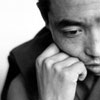[ back ] |
[ back to essays archives ] k
e v i n c o f f e y The alarm goes off. It's 6 am, 7, or 8:30. You pull the blankets tighter around your body, glance out the window. Bright sun, birds in the trees. Cloudless sky. You slip out of bed, choose pants, a shirt, and walk down the hall to the shower. Brush your teeth, wash your face, use the toilet. Dry off. You are warm and clean. The day hums with anticipation. In the kitchen you tune the radio to the morning news station. Pour yourself a bowl of cereal and a cup of coffee. Listen to the weather and the traffic, the score from last night's game, the morning market reports, the news from Capitol Hill. Everyday we make a series of choices that come mostly as second nature before the day really begins. What time we get up at, where we sleep, if the window is open or closed, the curtains drawn, what we'll wear, what temperature we'd like for our shower. This is independence practiced at its most fundamental and human level. And the ease with which the answers to these questions of day to day living present themselves allows us to be tangled in the web of questions we find more important: what route we'll take to work, what we'll do for our children's birthday, how we'll let loved ones know they are loved, what we'll make for dinner. Things which admittedly can make us feel somewhat less than free -- though it's a very basic independence which allows us to think about them in the first place. The
Chinese occupation of Tibet has generated an inordinate amount of meaningful statistics.
But independence is not fully understood through statistics. Nor is it fully understood
through political theory, or the abstract question of what constitutes statehood.
The Chinese occupation of Tibet is also the Chinese occupation of Tibetans. And
the question of independence is also one of personal dignities and freedoms. Teenagers
are imprisoned for drawing pictures, households for having photos of the Dalai
Lama, monks for singing songs of praise. When you read the statistics and digest
the political theories which are an integral part of the question of Tibetan Independence,
also remember the human touchstones of such questions: walls empty of paintings,
how favorite songs feel on your tongue, pictures of loved ones stacked in the
bottom of drawers, life in a windowless room, showers without hot water, days
without prayer. Kevin
Coffey is a writer living in New York's East Village. [ back to essays archives ] |
